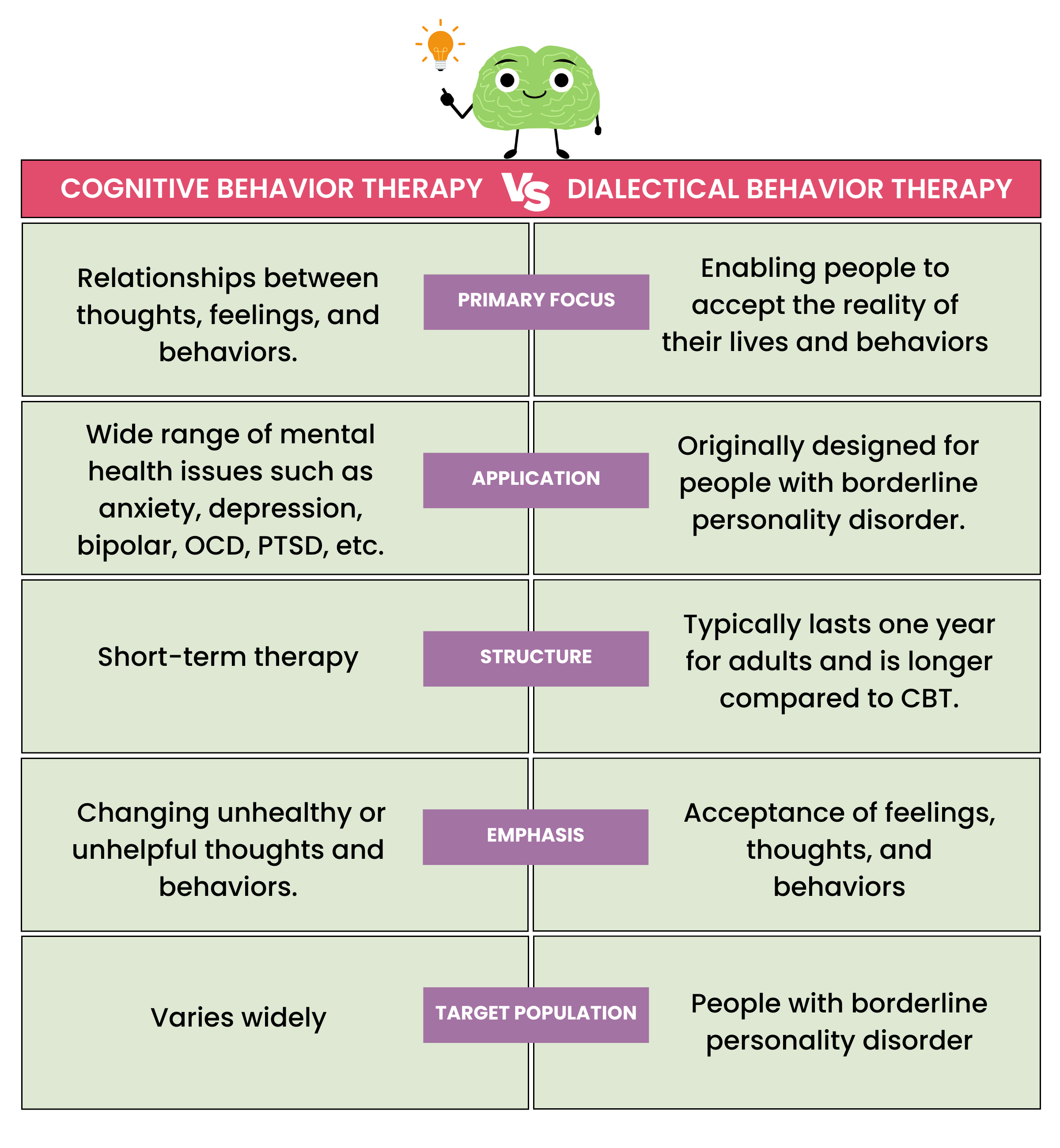Empowerment Via DBT London: Structure Durability, Finding Balance
Equipping Individuals Through Efficient Dialectical Behavior Treatment (DBT) Solutions: Structure Stronger Mental Health And Wellness Foundations
In the realm of psychological health and well-being, the relevance of encouraging individuals through effective Dialectical Behaviour Therapy (DBT) solutions can not be overemphasized. By focusing on the core concepts of DBT, such as boosting emotional law abilities, improving social performance, developing distress tolerance strategies, and cultivating mindfulness practices, people can embark on a trip in the direction of building more powerful psychological health and wellness foundations.
Recognizing the Core Principles of DBT


One core concept of DBT is recognition. Specialists using DBT acknowledge the individual's feelings and actions as legitimate actions to their atmosphere. This validation assists build a strong therapeutic partnership and urges individuals to function towards adjustment. Another fundamental aspect is dialectics, which educates individuals to watch situations from several viewpoints and locate the synthesis between conflicting thoughts or feelings.
Furthermore, the concept of dialectical abstinence is central to DBT. This principle urges people to avoid self-destructive actions while likewise approving themselves. By recognizing and integrating these core principles, therapists can successfully apply DBT strategies and support individuals in their trip in the direction of psychological regulation and mental wellness.
Enhancing Psychological Guideline Skills
Developing efficiency in handling emotions is a basic facet of promoting psychological wellness and social performance - DBT London. Enhancing emotional law abilities is a core part of Dialectical Behaviour Therapy (DBT) that outfits people with the tools to navigate extreme feelings in a healthy and balanced and positive manner. Via DBT, individuals find out to recognize, comprehend, and control their emotions, leading to boosted psychological wellness end results
DBT highlights the significance of mindfulness, which involves being existing in the minute without judgment. This method permits individuals to observe their feelings without ending up being bewildered by them, boosting their capability to react properly as opposed to react impulsively. By growing mindfulness, individuals can develop a better feeling of self-awareness and emotional control.
Furthermore, DBT shows functional skills such as distress resistance and emotion guideline strategies to assist people handle challenging feelings. By discovering these abilities, individuals can lower impulsive actions, enhance decision-making, and enhance their partnerships with others. Eventually, boosting emotional law skills through DBT equips people to lead more meeting and balanced lives.

Improving Interpersonal Efficiency
Having actually developed a strong foundation in emotional guideline abilities within the structure of Dialectical Behavior Therapy (DBT), the focus now shifts towards enhancing interpersonal effectiveness. Improving interpersonal performance is an important component of DBT as it outfits people with the needed skills to browse social interactions, communicate properly, established limits, and develop healthier connections.
In DBT, social efficiency abilities are shown via modules that concentrate on locations such as assertiveness, efficient interaction, and interpersonal analytic. By learning these abilities, people can enhance their capability to share their wishes and needs, keep self-worth, and build stronger links with others.
Exercising mindfulness is an important component of improving social efficiency within the DBT structure. Mindfulness enables people to be present in their communications, listen actively, and respond attentively as opposed to react impulsively. By including mindfulness into their day-to-days live, individuals can cultivate higher self-awareness and psychological policy, which are crucial for successful interpersonal interactions.
Structure Distress Tolerance Strategies
Exploring effective techniques for managing psychological distress is Going Here important for people looking for to improve their coping skills and durability. Building distress resistance methods is an important element of Dialectical Practices Treatment (DBT) that encourages individuals to browse difficult feelings without becoming overloaded - DBT London. One fundamental technique in DBT for distress resistance is the acronym "APPROVES," which means Activities, Adding, Comparisons, Feelings, Pressing away, Thoughts, and Feelings. By making use of these approaches, people can efficiently manage upsetting circumstances and manage their emotional responses.
Moreover, mindfulness methods play a significant role in structure distress tolerance. Mindfulness encourages people to stay present in the moment without judgment, enabling them to observe their thoughts and additional resources feelings without responding impulsively. This understanding allows people to tolerate distress much more effectively and develop a better sense of control over their responses.
Along with these techniques, developing a customized distress resistance plan with the advice of a skilled specialist can offer individuals with a customized technique to taking care of emotional distress - DBT London. By including these methods into life, individuals can reinforce their psychological health structures and boost their general health

Cultivating Mindfulness Practices
To strengthen their distress tolerance strategies even more, people can concentrate on cultivating mindfulness methods as a corresponding approach within the framework of Dialectical Behaviour Treatment (DBT) Mindfulness, an essential element of DBT, involves taking note of the here and now moment without judgment. By promoting mindfulness, people can enhance their awareness of thoughts, feelings, and physical experiences, promoting a deeper understanding of themselves and their experiences.
Mindfulness methods in DBT consist of strategies such as conscious breathing, body scans, and observing thoughts without attachment. These methods encourage individuals to develop a non-reactive stance in the direction of their inner experiences, enabling them to react to difficult circumstances with higher clearness and composure. By incorporating mindfulness into day-to-day routines, people can find out to control their emotions better, reduce spontaneous actions, and grow a sense of inner tranquility.
Via cultivating mindfulness practices, individuals undergoing DBT can build a solid structure for handling tension, improving partnerships, and enhancing total wellness. By integrating mindfulness right into their restorative journey, people can establish valuable abilities that equip them to navigate life's obstacles with durability and self-awareness.
Conclusion
In verdict, official statement reliable Dialectical Behaviour Treatment (DBT) services play an important role in equipping individuals to construct more powerful psychological wellness structures. By recognizing the core principles of DBT, improving emotional regulation abilities, improving interpersonal effectiveness, developing distress tolerance methods, and growing mindfulness methods, people are furnished with the needed tools to browse their emotions, connections, and obstacles in a more flexible and resilient way. DBT solutions provide a thorough method to advertising psychological wellness and encouraging individuals to lead satisfying lives.
By concentrating on the core concepts of DBT, such as enhancing emotional law skills, enhancing social performance, building distress tolerance methods, and growing mindfulness techniques, individuals can begin on a trip in the direction of structure stronger mental health and wellness structures. Enhancing psychological regulation skills is a core element of Dialectical Behavior Treatment (DBT) that outfits people with the tools to navigate intense emotions in a positive and healthy and balanced fashion.Additionally, DBT shows functional abilities such as distress resistance and feeling law techniques to aid individuals manage challenging emotions.To deepen their distress tolerance techniques further, individuals can focus on cultivating mindfulness practices as a corresponding approach within the structure of Dialectical Practices Treatment (DBT) By comprehending the core principles of DBT, improving emotional regulation skills, improving social performance, constructing distress resistance methods, and cultivating mindfulness methods, people are geared up with the necessary devices to navigate their emotions, partnerships, and difficulties in a much more resilient and flexible way.